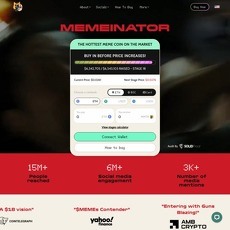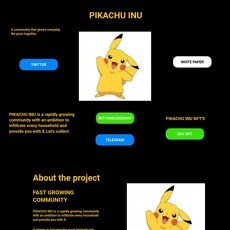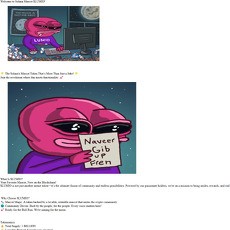Fayda Review
Fayda
fayda.games
If your website is on the scam list and you think that you are not a scammer, contact us. After you provide us with all the proof that you are in Crypto World with good intentions, we will delist you. Usually, you get in this category because you are hiding your team, you have a bad reputation(you are tricking, deceiving, scamming people), and you haven't got a written project whitepaper or is a shitty one....
Their Official site text:
Intro
Currently, the cryptocurrency space is undergoing global transformations. Traditional financial institutions are trying to take away users' independence and individuality in an attempt to control their cryptocurrency operations. From 2009 to 2017, banks underestimated the seriousness of this market, but today, they recognize potential threats to their business. Decentralized Finance (DeFi) is replacing centralized financial institutions (CeFi), offering a future of interaction on the blockchain with openness and transparency, free from demeaning and coercive procedures. The market needs new, exciting projects focused on direct interaction with decentralized exchange (DEX) smart contracts, expanding the possibilities of this technology.
Technologies become outdated and perform their functions differently than intended, and this dynamic also applies to the modern economy, changes in which are not always predictable. In 2020, humanity faced a serious challenge - the COVID-19 pandemic. This situation forced millions of people to stay at home and led to the shutdown of businesses worldwide. To support the economy, central banks took measures, including lowering interest rates and issuing additional funds.
This monetary response led to the widespread provision of cheap, unsecured loans, causing a significant increase in inflation. Inflation is bad, but the economy, if it lacks circulating money, becomes stagnant like still water turning into a swamp. Continuous issuance of new money is normal if the new money is involved not only in consumption but also in developing new technologies to expand the economy.
These events inspired us to create the FAYDA game. It incorporates familiar mechanisms used in the circulation of money in society. However, unlike macroeconomics, our game is created using smart contracts, ensuring absolute transparency and clarity of all financial operations. The Web3 segment is filled with projects where most ideas are repetitive and aimed only at the quick enrichment of developers. Our game is a genuinely working product that utilizes the capabilities of Web3 technologies.
The main idea of the project is that in the event of losses in the game, if a player used the "Loss Compensation" insurance, they can receive compensation equivalent to the loss amount in FAYD tokens. Loss compensation insurance is the amount in FAYD tokens that a player must have at the time of entering the game. An important figure determining the amount of loss compensation insurance is the "Insurance Rate" , a coefficient that is updated once a day and depends on activity in the project. Player profits are subject to tax , the size of which may change during the game and depends on the FAYD rate. All taxes and most of the fees go to the purchase and burning of FAYD in the pool, to which 85% of the issued FAYD tokens were sent during creation. WBNB/FAYD Pool is deployed on the DEX PancakeSwap v2 , and the liquidity token is destroyed .
Game description
The player selects a number from 1 to 100 and deposits a BNB amount, which forms the game budget. The game can have 2 to 4 players. The number of players and entry cost is set by the game creator. Once all players join the game, it enters a waiting mode for result processing (random number generation and distribution of the game budget). Based on the game results, the further the player's number is from the generated random number, the larger their share of the game budget. If a player's share is less than the amount they deposited (excluding a 2% fee), they may receive compensation in FAYD tokens equivalent to the loss amount, provided they enable "Loss Compensation" when creating or joining the game. To use loss compensation, the player must have a specified amount of FAYD tokens on their address, which are temporarily locked during the game and fully refunded after the game ends.
1. Game Creation: The game creator selects their number from 1 to 100, specifies the number of players, entry cost, and deposits this amount including a 2% fee. The game creator can enable "Loss Compensation" to protect themselves from losses, requiring a specified amount of FAYD tokens on their address.
2. Participation in the Game: The player selects their number from 1 to 100 and pays the entry cost including a 2% fee. The chosen number must be at least 10 points away from other players' numbers. When entering the game, the participant can enable "Loss Compensation" to protect themselves from losses, requiring a specified amount of FAYD tokens on their address.
3. Result Processing: Once the last player joins the game, it enters a results processing waiting mode. The closure of the game and the allocation of shares to participants are initiated when new players join any other game. During game closure, a random number from 1 to 100 is generated based on the block hash. The further the player's number from the random number, the larger their share of the game budget. Conversely, the closer the player's number to the random number, the smaller their share. If a player's share is higher than the amount they deposited (excluding a 2% fee), a profit tax is deducted. The profit tax in BNB goes to the liquidity pool for FAYD token buyback and burning. If a player's share is lower than the amount they deposited (excluding a 2% fee), and "Loss Compensation" is enabled, the player receives compensation equal to the loss amount in FAYD tokens.
4. Blockchain and Security: All game-related actions are recorded on the blockchain and cannot be altered. Result processing, FAYD token minting and burning, random number generation, and the smart contract are implemented in a decentralized environment. The game's smart contract is a hybrid of the game itself and the token (BEP-20) smart contract, interacting with the WBNB/FAYD liquidity pool smart contract on PancakeSwap . The liquidity pool token is destroyed, and the game's smart contract has no owner.
Random Number Generation
Based on a random number, when the game is closed, the calculation and distribution of the budget among players take place. According to the game rules, the player whose number is furthest from the random number receives the largest share of the game budget.
When choosing a method for generating random numbers in smart contracts, two well-known approaches are often used: oracles and block hashes. Each of them has its own advantages and disadvantages:
Oracles: An oracle is an external data source for the smart contract and is essentially centralized.
Block Hashes: A block hash can be calculated considering the interests of validators, but such manipulation is not interesting if the costs outweigh the potential benefit.
Comparing these two approaches, the method using block hash was chosen for generating a random number in the smart contract of the game.
The algorithm for generating a random number in our smart contract is structured as follows:
After the entry of the last player, the game enters the results processing waiting mode.
The smart contract assigns the current block number to the game.
When a new transaction related to entering any game appears in the smart contract, the algorithm for generating a random number and processing results for one of the games waiting for results processing is triggered. Thus, a player joining any game initiates the results processing algorithm for one of the previous games. The algorithm compares the block number at which the game entered the waiting mode and the number of the last closed block in the network. If there is a difference between these numbers, the algorithm uses the hash of the last closed block to generate a random number.
Calculation of game results
After completing the game, the distribution of its budget among the participants takes place. For this purpose, calculations are sequentially performed in the smart contract as follows:
1. Player's Weight - this is the numerical difference between the number chosen by the player and the randomly generated number after the game. For example, if a player chooses the number 35, and the randomly generated number is 45, then the player's weight will be 10.
2. Game Weight Coefficient
=
100
Sum of weights of all players
3. Player's Share of the Game Budget, % = Game Weight Coefficient × Player's Weight
4. Player's Share of the Budget, BNB = Game Budget × Player's Share of the Game Budget, %
If the player's share of the game budget is greater than the amount contributed by the player (excluding 2% commission), the player's profit is calculated. Otherwise, the player's loss and loss compensation are calculated.
5. Calculation of Player's Profit.
If at the closing of the game the WBNB/FAYD exchange rate in the pool is higher or equal to the rate at the time of game creation, profit tax = 50%. If the rate is lower, profit tax = 85%.
Profit Tax, BNB = (Player's Share of the Game Budget, BNB - Entry Cost without commission, BNB) × Tax, %
Amount Received, BNB = Player's Share of the Game Budget, BNB - Tax, BNB
6. Calculation of Player's Loss and Compensation.
Player's Loss, BNB = Entry Cost without commission, BNB - Player's Share of the Game Budget, BNB
In case of loss, the player's address is credited with "Player's Share of the Budget in BNB," and when using "Loss Insurance," compensation for the loss is credited in the form of FAYD tokens, equivalent to the amount of "Player's Loss in BNB."
The volume of loss compensation is calculated and checked based on the formula using the current pool reserves and the volume of "Player's Loss in BNB":
Loss Compensation, FAYD
=
Player's Loss, BNB × Pool Reserve, FAYD
Player's Loss, BNB + Pool Reserve, WBNB
The compensation volume is calculated as if, at the time of game closure, the player bought FAYD tokens on the exchange for the amount of the loss in BNB.
Loss Insurance
If, as a result of the game, the player's share of the game budget in BNB turns out to be less than the deposited amount in BNB (excluding the commission), the player may receive compensation equivalent to the loss amount in the form of the FAYD token.
To take advantage of loss compensation, players need to enable the "Loss Insurance" option when entering the game or creating it. In this case, the player's address must have FAYD tokens in the specified amount. These tokens are locked in the smart contract for the duration of the game and are returned to the player's address in full after the game ends.
"Loss Insurance" is calculated at the time of game creation using the formula:
Loss Insurance, FAYD
=
Entry cost in BNB
Current WBNB/FAYD exchange rate
×
Insurance rate
Compensation for loss involves minting new FAYD tokens and crediting them to the player's address.
The compensation amount (the volume of minted FAYD tokens) is calculated based on the current pool reserves and the player's loss volume in BNB:
Compensation, FAYD
=
Player's loss in BNB × Pool reserve in FAYD
Player's loss in BNB + Pool reserve in WBNB
The compensation volume is calculated as if, at the time of game closure, the player bought FAYD tokens on the exchange for the amount of the loss in BNB.
Insurance Rate
The insurance rate is the equivalent of an interest rate within the smart contract. If the number of games per day increases compared to previous days, the insurance rate increases proportionally. If the number of games per day decreases, the insurance rate decreases proportionally. The coefficient cannot have a value below 1, and it also cannot increase more than double in a day.
This coefficient is used in the calculation of loss compensation. The higher the insurance rate, the higher the amount in FAYD tokens that needs to be locked on the smart contract of the game to compensate for losses.
Fee and taxes (Token Burn)
All fees and taxes in BNB are distributed as follows:
When creating a game or entering a game, a 2% commission is charged from the player, which is distributed as follows: 1.9% goes to the liquidity pool for the redemption and burning of FAYD tokens, to reduce the circulating supply, and the remaining 0.1% goes to the developers' address.
When closing the game, a tax is levied on the player's profit, the amount of which depends on the FAYD rate at the time of game creation and closure:
If the FAYD rate in the liquidity pool is higher or equal to the rate fixed when creating the game, the profit tax will be 50%. If the rate is lower, the profit tax will be 85%. The entire tax amount is used for the redemption and burning of FAYD tokens to reduce the circulating supply.
Liquidity pool
The WBNB/FAYD pair is placed on PancakeSwap v2.
85% (42,500,000 FAYD) of the issued tokens have been sent to the liquidity pool against 42.5 WBNB. This determined the initial price of the FAYD token (0.000001 WBNB per 1 FAYD).
The liquidity pool token has been burned.
The pair pool's smart contract is an integral part of the game's smart contract:
All project fees and taxes are sent to the pool.
The pool queries the token price and reserves.
Tokenomics
Smart contract address 0x696b2518190211879d6ea281664B690Ef327B717
Initial total supply: 50,000,000.
Symbol: FAYD.
Decimals: 18.
Token distribution:
85% 42.500.000 FAYD
allocated to the liquidity pool.
5% 2.500.000 FAYD
held by the project developers.
2.5% 1.250.000 FAYD
used for marketing the "FAYDA" game.
2.5% 1.250.000 FAYD
locked for marketing the "Tic-Tac-Toe" game until 03-2024.
2.5% 1.250.000 FAYD
locked for marketing the "Predictor" game until 06-2024.
2.5% 1.250.000 FAYD
locked for marketing the "Figures" game until 10-2024.
Contacts
Twitter: Fayda_Games
Telegram: fayda_official
Smart Contract
Address:
0x696b2518190211879d6ea281664B690Ef327B717













